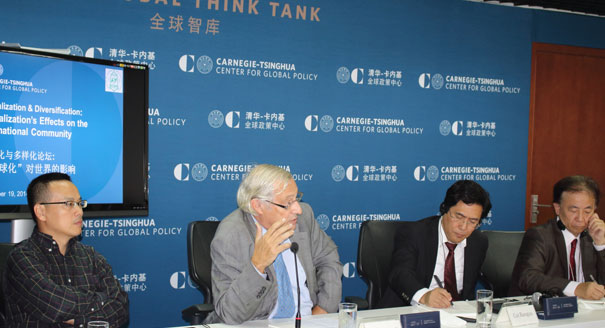Registration
You will receive an email confirming your registration.
Globalization has integrated the global economy and lifted billions of people out of poverty. However, it has also dispersed global political power and has strained the existing world order. Nations struggle to respond to crises from Iraq and Syria to the spread of the Ebola virus.
The Carnegie–Tsinghua Center for Global Policy and the Tsinghua School of Journalism and Communications co-hosted a discussion on globalization featuring Bertrand Badie of Sciences Po, Cui Baoguo of Tsinghua University, Marie-Françoise Durand of Sciences Po, and Wataru Sawamura of Asahi Shimbun. The discussion was moderated by Carnegie–Tsinghua’s Chen Qi
Discussion Highlights
- Transformation of World Order: The speakers discussed the fact that interactions between sovereign nations have experienced several drastic upheavals in the past century and a half. While historically global affairs were predominantly controlled by the Western world, several world wars and the continued development of international law has dramatically shifted power. This makes it difficult for powerful countries to unilaterally dictate policy, participants explained. The growing inter-reliance and interconnectedness of developed and developing nations means that great and emerging powers alike are increasingly being treated as equal members in the international community.
- Exacerbating Conflict: Some of the speakers asserted that the Treaty of Versailles, which concluded World War I in 1919, fundamentally changed international relations. They argued that the severe punishment of the Central Powers through reparations and other measures were enacted to discredit their legitimacy and prestige. In the modern era, they continued, punishment continues to serve as a central tenet when dealing with opposing governments. Some speakers suggested that this insistence on humiliating enemies, coupled with the refusals to negotiate, has led to the current crises occurring in the Middle East.
- Chinese Perspective on “Westernization”: There was significant disagreement between speakers on how to define globalization and national attitudes towards it. Some participants argued that from the Chinese perspective, globalization is just a continuation of the forced integration of China into the world economy that started after the Opium wars in the nineteenth century. Other speakers disagreed, stating that in the last forty years the Chinese have benefited more from globalization than possibly any other country.
- Beyond State Actors: Globalization creates complex relationships that extend beyond inter-government relations, participants said. These relationships affect business, social, and civil interactions. Speakers stressed that for governments, it can be difficult to react to the growing demands of participating in the international community. Therefore, they emphasized the critical role of the individual in establishing bridges of mutual understanding and cooperation towards common goals.
- Globalization as a Source of Conflict: While focusing on the importance of global interaction, speakers also cautioned against overemphasizing the role of access to and exchange of information. Thanks to the internet and modern technologies, there are increased interactions, but this does not guarantee greater understanding or more accurate information. Speakers warned that not only can information bring people together, but it can divide them as well. The internet is an indiscriminate tool for uniting and conveying both positive ideas such as world peace, and negative ideas like racism. Furthermore, information asymmetries and a lack of understanding between all actors can create both tensions and conflict, they concluded.
Chen Qi
Chen Qi is a resident scholar at the Carnegie–Tsinghua Center for Global Policy. An expert on U.S.-China relations, global governance, and China’s foreign policy, Chen runs the Carnegie-Tsinghua Center’s U.S.-China Track II dialogue.
Bertrand Badie
Bertrand Badie is a French political scientist and international relations specialist. He is a professor at the Institut d’Etudes Politiques de Paris and researcher associated with the Centre d’Etudes et de Recherches Internationales (CERI).
Cai Baoguo
Cui Baoguo is a professor and deputy dean of Tsinghua University’s School of Journalism and Communications. Cui is also the director of the Center for Media, Management and Economics Studies at Tsinghua University.
Marie-Françoise Durand
Marie-Françoise Durand is a professor at the Institute d’Etudes Politiques in Paris.
Wataru Sawamura
Wataru Sawamura has held diverse posts for Asahi Shimbun as a correspondent in New York, London, and head of the Paris office. Sawamura is currently Asahi Shimbun’s deputy managing editor.
